
SPE RESERVOIR EVALUATION & ENGINEERING
Scope & Guideline
Exploring the Depths of Reservoir Engineering Excellence
Introduction
Aims and Scopes
- Reservoir Characterization and Modeling:
Research on methods for accurately characterizing and modeling reservoirs, including the use of advanced geophysical techniques, core analysis, and simulation models to better understand reservoir properties and behaviors. - Enhanced Oil Recovery (EOR) Techniques:
Investigation into various EOR methods, including chemical flooding, gas injection, and thermal methods, aimed at maximizing hydrocarbon recovery from existing reservoirs. - Data-Driven Approaches and Machine Learning:
Application of machine learning and data analytics techniques to improve reservoir modeling, predict production outcomes, and enhance decision-making processes in reservoir management. - Petrophysical Analysis and Fluid Dynamics:
Study of the physical properties of reservoir rocks and fluids, including porosity, permeability, and fluid behavior under various conditions, to inform reservoir management strategies. - Sustainability and Environmental Impact Assessments:
Research focusing on the sustainability of reservoir management practices, including the assessment of environmental impacts and the development of methods for minimizing negative effects during hydrocarbon extraction.
Trending and Emerging
- Integration of Machine Learning and AI:
There is a growing trend towards employing machine learning and artificial intelligence techniques to enhance reservoir modeling, optimize production strategies, and improve decision-making processes, indicating a significant shift in methodology. - Focus on Sustainability and Environmental Management:
An increasing number of papers are addressing the environmental impacts of reservoir engineering practices, highlighting the industry's commitment to sustainability and the need for responsible resource management. - Complex Fluid Behavior and Multiphase Flow Dynamics:
Research is increasingly focusing on the complexities of fluid interactions within reservoirs, including multiphase flow dynamics and their implications for enhanced oil recovery, reflecting the need for more comprehensive models. - Advanced EOR Techniques and Hybrid Approaches:
Emerging themes in enhanced oil recovery are centering around innovative and hybrid techniques that combine different methods to maximize recovery efficiency, indicating a move towards more integrated strategies.
Declining or Waning
- Traditional Reservoir Simulation Techniques:
There appears to be a declining focus on conventional reservoir simulation methods, as newer and more sophisticated approaches, such as machine learning and hybrid models, gain traction and popularity. - Basic Geomechanical Studies:
While geomechanical studies remain important, there is a noticeable reduction in basic research focused solely on geomechanics without integration into broader reservoir management or enhanced recovery strategies. - Single-Phase Flow Studies:
Research specifically concentrating on single-phase flow in reservoirs is becoming less emphasized, with a shift towards more complex multiphase flow and interactions that better reflect actual reservoir conditions.
Similar Journals
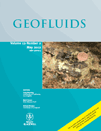
GEOFLUIDS
Shaping the Future of Geological Fluid StudiesGEOFLUIDS, published by WILEY-HINDAWI, is an esteemed open-access journal dedicated to advancing the field of Earth and Planetary Sciences since its inception in 2001. With an ISSN of 1468-8115 and E-ISSN 1468-8123, the journal has become increasingly accessible, allowing for broader dissemination of research findings since adopting an open-access model in 2017. The journal has established itself within the academic community, achieving a Scopus rank of #86 in the domain of General Earth and Planetary Sciences, placing it in the 56th percentile, and garnering a Q3 category classification as of 2023. GEOFLUIDS serves as a platform for interdisciplinary exchange of ideas and findings—encouraging contributions that explore fluid dynamics in geological systems and their implications for natural resources and environmental management. Researchers, professionals, and students alike are invited to contribute to and engage with the latest research in this growing field, further enhancing the journal's role in shaping the future of Earth science research.

CT&F-Ciencia Tecnologia y Futuro
Shaping the future of energy and fuel technology.CT&F-Ciencia Tecnologia y Futuro, a distinguished open-access journal published by ECOPETROL SA, serves as a vital platform for the dissemination of innovative research and advancements in the fields of chemical engineering, energy, fuel technology, and the broader disciplines within the geosciences. Established in 1996 and operating continuously until 2023, this bilingual journal aims to foster collaboration and knowledge exchange among researchers, professionals, and students in Colombia and beyond. With an increasing emphasis on sustainability and renewable energy, CT&F aligns with contemporary academic priorities and societal challenges. Although currently ranked in the Q4 category across multiple disciplines, the journal remains committed to enhancing its impact and accessibility, providing researchers with valuable insights and a significant forum to share their findings, all under the auspices of open-access since 2009. Explore a wealth of research as you contribute to the ongoing dialogue shaping the future of science and technology.
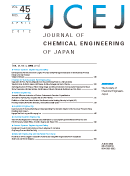
JOURNAL OF CHEMICAL ENGINEERING OF JAPAN
Pioneering Insights in the Heart of Chemical EngineeringJOURNAL OF CHEMICAL ENGINEERING OF JAPAN is a distinguished academic publication in the field of chemical engineering and chemistry, published by Taylor & Francis Ltd. With its ISSN 0021-9592 and E-ISSN 1881-1299, this journal has been a vital resource for researchers and practitioners since its inception in 1968 and continues to provide essential insights and advancements through 2024. The journal operates under an Open Access model as of 2023, promoting wider dissemination of research findings and encouraging collaboration within the global scientific community. Currently categorized in the Q4 quartile for both Chemical Engineering and Chemistry (miscellaneous) in 2023, it ranks within the lower percentiles of its respective fields, offering a platform for emerging scholars to publish their work and gain visibility. As part of Japan's academic landscape, it addresses numerous aspects of chemical engineering, fostering innovation and technical development that contribute to the industry's growth. Engaging with this journal is paramount for those looking to stay informed on the latest research trends and applications in chemical processes.

Petroleum Exploration and Development
Empowering Research in Petroleum EngineeringPetroleum Exploration and Development is a premier open-access journal published by KEAI PUBLISHING LTD, dedicated to advancing the fields of petroleum exploration and extraction as well as associated technologies. Since its inception in 2008, the journal has established itself as a key resource for researchers and professionals across various disciplines, evidenced by its impressive Q1 rankings in multiple categories including Economic Geology and Energy Engineering. With an impact factor that reflects its high citation rates and academic significance, this journal offers a unique platform for disseminating cutting-edge research related to geological studies, geochemistry, and energy sustainability. By making all its content freely accessible, Petroleum Exploration and Development ensures that its findings are available to a global audience, fostering collaboration and innovation within the community. Researchers, industry professionals, and students will find valuable insights and advancements in the realm of petroleum science, making it an essential part of their academic and professional libraries.
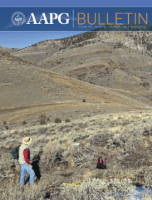
AAPG BULLETIN
Shaping the dialogue in geology and energy engineering.AAPG BULLETIN, published by the American Association of Petroleum Geologists, stands as a premier journal in the fields of Earth Sciences and Energy Engineering. With an impressive history spanning from 1968 to 2023, the journal has established itself as a valuable resource for researchers and professionals alike, focusing on a wide array of topics including geology, geochemistry, petrology, and fuel technology. Its robust standing in the academic community is reflected in its recognition as a Q1 journal across multiple categories such as Earth and Planetary Sciences, Energy Engineering, and Geology, with notable rankings in prestigious databases like Scopus. Although not an open-access journal, the AAPG BULLETIN provides vital insights and studies that advance our understanding of Earth processes and energy resources. It serves as an essential platform for disseminating cutting-edge research, fostering collaboration, and inspiring the next generation of scientists and engineers in the pursuit of sustainable energy solutions.

Interpretation-A Journal of Subsurface Characterization
Fostering Collaboration in Subsurface Research and InnovationInterpretation: A Journal of Subsurface Characterization is a premier academic journal dedicated to advancing the methodologies and technologies integral to the characterization of subsurface environments. Published by the Société de l'Exploration Geophysicists (SEG), this journal serves the fields of geology and geophysics, reflecting its critical role in the intersection of these domains. With an h-index that underscores its scholarly impact and its ranking in the Q2 category for both Geology and Geophysics, Interpretation is recognized for publishing high-quality, innovative research that offers valuable insights and solutions to contemporary challenges in subsurface exploration. Since its inception in 2013, the journal has quickly become essential reading for researchers, professionals, and students alike, providing open access to a wealth of knowledge fostering collaboration and advancement within the geoscience community. Featuring a comprehensive range of studies, methodologies, and reviews, Interpretation is integral for professionals striving to enhance their understanding of subsurface dynamics and impacting areas such as resource management, environmental conservation, and hazard assessment.

SPE JOURNAL
Transforming Challenges into Sustainable SolutionsSPE JOURNAL, published by the Society of Petroleum Engineers, is a leading academic journal that provides a platform for the dissemination of high-quality research in the fields of energy engineering, geotechnical engineering, and engineering geology. With a solid impact demonstrated by its Q1 ranking in both Energy Engineering and Power Technology, as well as Geotechnical Engineering, the journal is well-positioned to influence advancements in sustainable energy practices and geotechnical methodologies. Covering research from 1969 through 2024, the SPE JOURNAL is dedicated to publishing innovative studies that contribute to the field's body of knowledge while addressing the challenges facing the global energy landscape. Though it does not offer open access, the journal’s rigorous peer-review process ensures that published works are of the highest academic quality, making it an essential resource for researchers, professionals, and students alike aiming to stay at the forefront of energy and geotechnical developments.
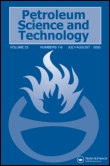
PETROLEUM SCIENCE AND TECHNOLOGY
Contributing to the evolution of petroleum science and technology.PETROLEUM SCIENCE AND TECHNOLOGY, published by Taylor & Francis Inc, is a pivotal journal dedicated to advancing the multidisciplinary field of petroleum engineering and related technologies. With an ISSN of 1091-6466 and an E-ISSN of 1532-2459, this journal serves as a vital platform for disseminating research in areas ranging from geotechnical engineering to energy technology. As of 2023, it is recognized in the Q3 quartile across several categories, including Chemical Engineering and Fuel Technology, signifying its respectable standing within the academic community. With a convergence timeline from 1997 to 2024, the journal continuously addresses crucial issues in the energy sector, making it essential reading for researchers, industry professionals, and policy-makers alike. Although not an open access journal, its rigorous peer-reviewed articles contribute significantly to the advancement of knowledge and innovation within these fields, reflecting the journal's commitment to promoting scientific understanding and practical applications.
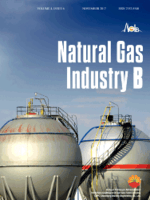
Natural Gas Industry B
Transforming insights into impactful solutions.Natural Gas Industry B is a premier peer-reviewed journal dedicated to the exploration and advancement of knowledge in the field of natural gas and its allied industries. Published by KEAI PUBLISHING LTD in the Netherlands, this open-access journal has been a vital resource for researchers and industry professionals since its inception in 2014. With an impressive categorization in Q1 and Q2 quartiles across diverse areas such as Geology, Energy Engineering, and Modeling and Simulation, the journal's impact is underscored by its strong Scopus rankings--including a percentile rank of 83rd in Geology. Natural Gas Industry B provides a platform for insightful research that addresses the myriad challenges and innovations within the natural gas sector, fostering a deeper understanding of both technical and environmental perspectives. As an open-access journal, it ensures that groundbreaking research is readily available to the global academic community, supporting the dissemination of knowledge and catalyzing collaboration among students, researchers, and professional engineers.
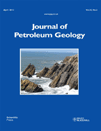
JOURNAL OF PETROLEUM GEOLOGY
Pioneering Insights for Earth and Energy SciencesJOURNAL OF PETROLEUM GEOLOGY, published by WILEY, is a prestigious peer-reviewed journal that serves as a vital platform for advancing knowledge in the fields of Earth and Planetary Sciences, Energy Engineering, and Geology. Established in 1978, this journal has cultivated a significant impact, reflected in its 2023 Q2 category rankings across multiple disciplines including Fuel Technology and Geology. Notably, it holds a commendable position in Scopus rankings, marking its importance with a 68th percentile in Earth and Planetary Sciences - Geology. While the journal operates under a traditional subscription model, its extensive repository of research articles facilitates crucial discussions and innovations among researchers, professionals, and students alike. The JOURNAL OF PETROLEUM GEOLOGY is pivotal for those seeking to explore and contribute to the evolving landscape of petroleum geology, offering insights that are essential for both academic and applied science domains.